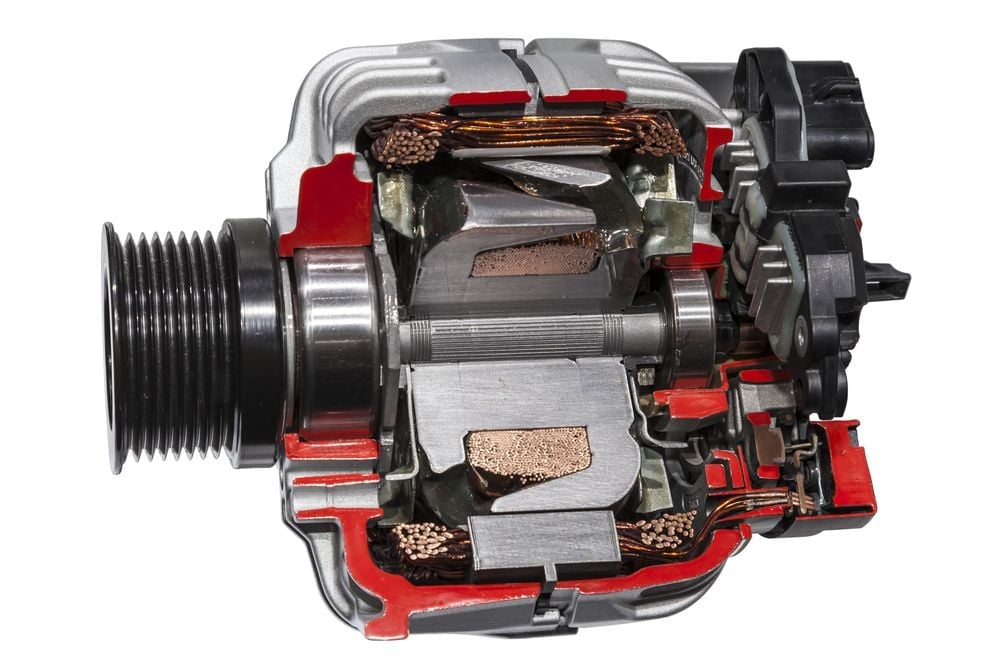
An alternator plays an important part in the operation of a vehicle by converting mechanical energy into electrical energy. The electrical energy is then used to charge the vehicle's battery and power the vehicle's electrical components.
An alternator can be damaged by improper or compromised wiring, an incompatible or weak battery, and corrosion caused by moisture.
Keep reading to learn more about how connections between the alternator and battery affect alternator performance and damage.
We'll dive into the possibilities of what makes an alternator go bad and more.
 A cutaway of an alternator.
A cutaway of an alternator.
Can A Battery Mess Up An Alternator?
Many car owners believe a bad or faulty battery can damage the car's alternator.
A battery can mess up an alternator, but often the opposite is more common; a poorly performing alternator can lead to a dead battery.
One way a battery could mess up an alternator is if the battery has a short. A short effectively causes an infinitely high power draw on the alternator, which could cause it to burn out.
A common symptom of shorts in your electrical system is burnt fuses. These fuses will protect your electrical system from shorts by burning out, which effectively breaks the electrical circuit to prevent damage from too much current.
Can A Weak Battery Destroy An Alternator?
It's possible that a weak battery may require too much current output from the alternator, which over time may lead to alternator failure due to overloading.
Overloading an alternator can lead to bad rectifier diodes and damaged slip rings.
Most of the time, you will isolate your charging problems to the weak battery, but it's important to get tested when you get the battery replaced.
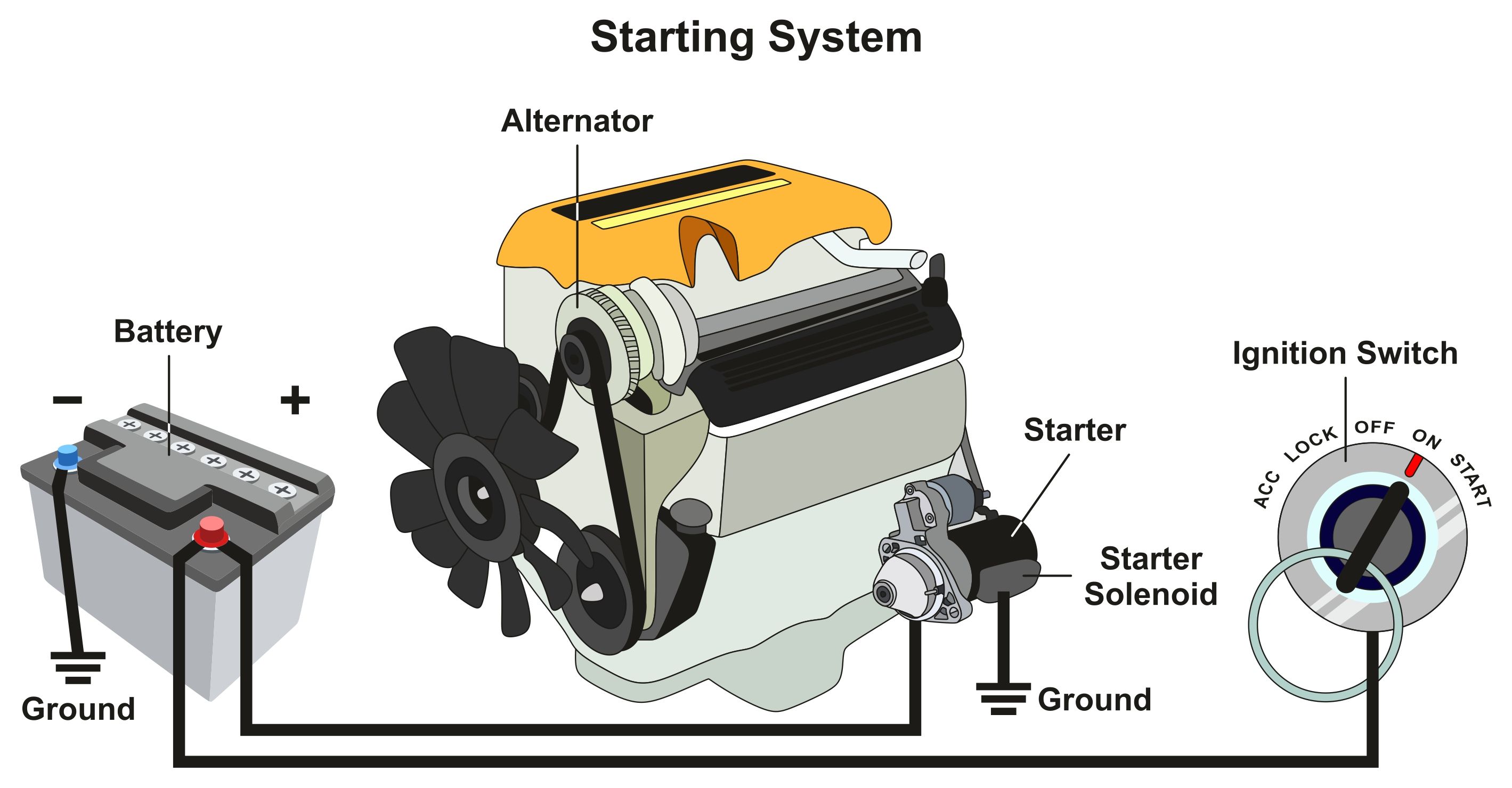 The alternator and battery work together to start the vehicle.
The alternator and battery work together to start the vehicle.
Can Jump-Starting Ruin An Alternator?
Jump-starting a vehicle can damage its electrical components and its alternator if done incorrectly.
In modern vehicles, it's particularly important to follow the vehicle's owner's manual to the tee; otherwise, you can damage the vehicle's complicated electrical system.
After jump-starting your vehicle, it's important to get your charging system tested immediately to troubleshoot what caused the need for the jump start in the first place.
Can A Loose Belt Damage An Alternator?
A loose alternator belt will not damage your alternator, but it will prevent the alternator from maintaining the correct system voltage in your vehicle.
The alternator belt, also called the serpentine belt plays an integral role in adequately operating your charging system.
The alternator belt is what transfers the mechanical energy to the alternator to create the electrical energy needed to maintain the correct system voltage to power the electrical systems in the vehicle.
The alternator belt can also operate other components in your vehicle, such as the power steering pump and air conditioning.
A loose alternator belt will slip, often making a squealing noise, which means the alternator won't rotate enough to provide the correct charging voltage.
Luckily, the alternator belt replacement cost is quite economical and will only cost you around $20 for the belt, along with about 30 minutes of labor.
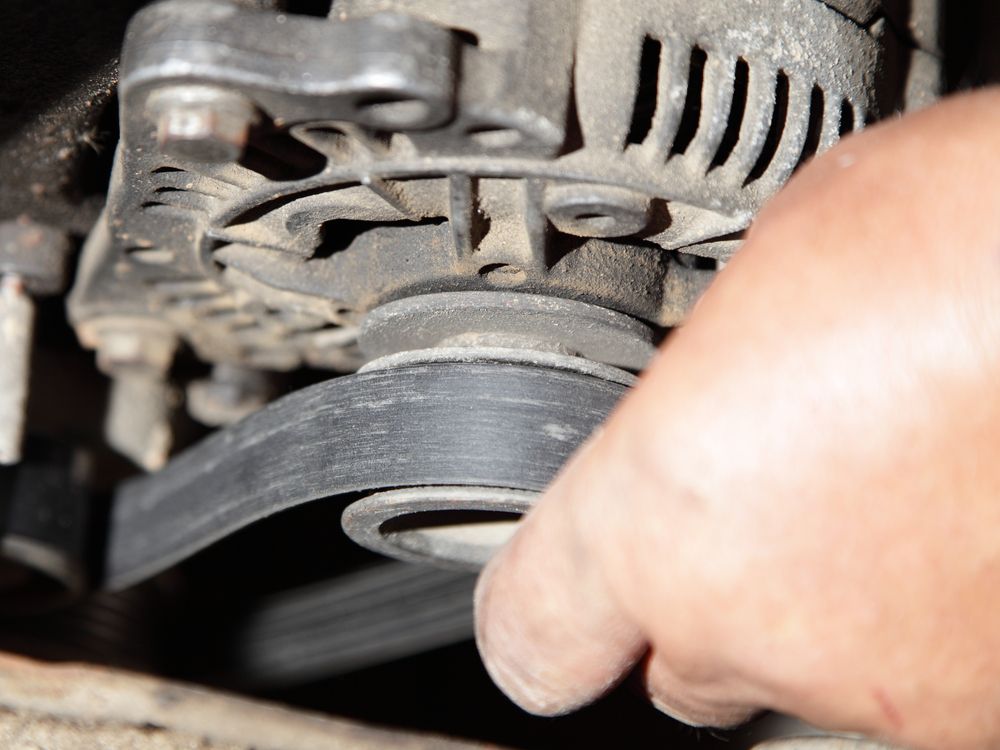 Checking the tension of an alternator belt.
Checking the tension of an alternator belt.
Can Water Damage An Alternator?
The electrical components under the hood of a vehicle a moisture resistant, and the alternator is no exception.
That said, water could damage an alternator in certain circumstances, like in a flood where the alternator is completely submerged for a long time.
Luckily, alternators - especially modern ones - are designed to withstand an average amount of contact with water and won't be damaged by water or moisture in normal conditions.
Can Bad Or Incorrect Wiring Damage An Alternator?
Bad or incorrect wiring can certainly damage an alternator or, at the very least, cause serious electrical problems that significantly impact the vehicle's operation.
The biggest problem bad or incorrect wiring could cause is a short.
A short could lead to overloading of the alternator and damaged rectifier diodes which are part of the alternator that converts AC power to DC power.
Poorly insolated wires clumped closely together will lead to electrical arcing between the two wires and the malfunction of the alternator.
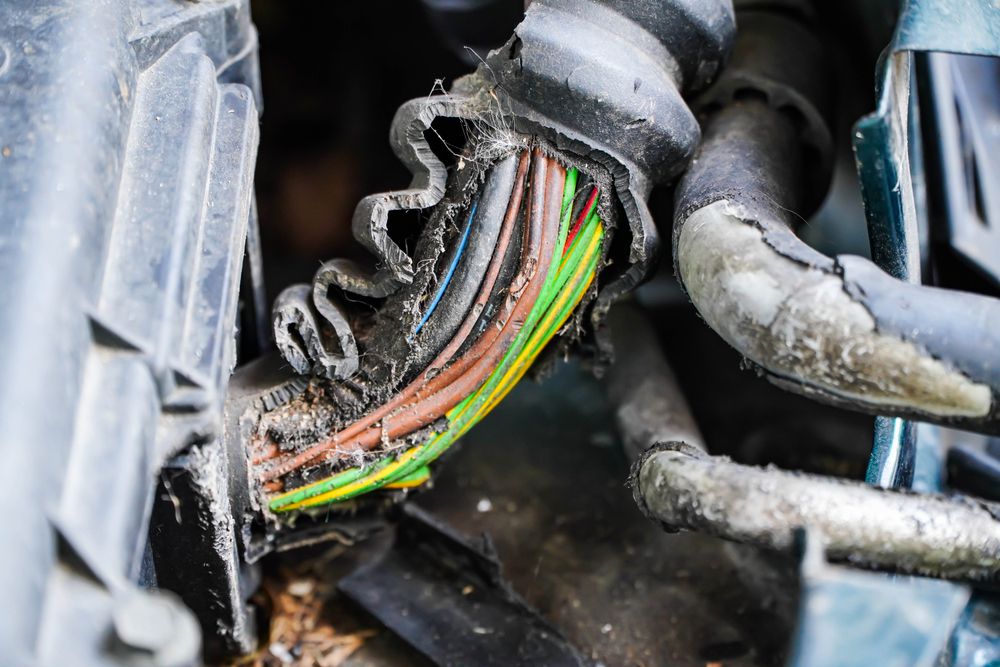 Damaged wiring in a car's engine bay
Damaged wiring in a car's engine bay
Loose Or Weak Wire Connections Between The Alternator And The Battery
A loose or weak connection from the alternator to the battery prevents the battery from receiving the charge it needs to supply the vehicle with the electrical power it requires.
Corroded battery posts are the most common causes of a weak connection to the battery. You can easily clean battery posts with a wire brush and then spray them with an anti-corrosion battery post spray to prevent corrosion from causing problems in the future.
Wiring connects your car battery to your alternator, and it's necessary for transferring power.
Your alternator may have to work much harder to compensate if the connection is weak, putting a strain on it, and leading to damage.
Reversing The Polarity Of The Alternator Connections
When you hear of "alternator polarity," we're talking about the polarity with which the alternator is designed.
Some people believe you can reverse the polarity of the alternator (or run it "backward").
However, if possible, you should avoid doing this because it can cause extreme damage to the alternator and other parts.
Complications range from a shorted car battery to hazardous combustion beneath the car's hood.
Disconnecting The Alternator When The Engine Is Running?
You can sometimes disconnect the alternator wire while the engine is still running to run the car on the alternator alone.
But it's important to note that you don't have to, and if you can avoid it, you should.
You can make the disconnection while the engine is turned off, then turn the car back on.
It's better to take this route to avoid a voltage surge that could blow the car's regulator.
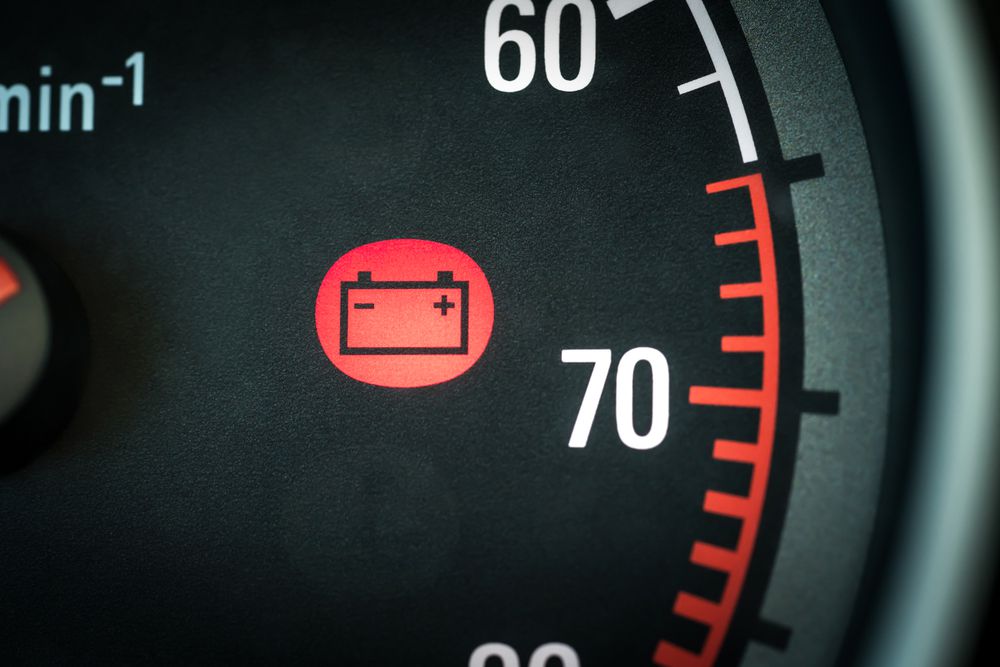 Battery warning light can indicate a damaged alternator.
Battery warning light can indicate a damaged alternator.
What Are Signs Your Alternator Is Going Out?
Some things that may indicate an alternator that's going out or failing include:
- Dimming or flickering headlights or interior cabin lights
- On the contrary, overly bright vehicle lights
- Engine stalling or difficulty starting
- A foul odor coming from burning connection wires
- An inability to turn on or use electronic components
- Strange sounds coming from your engine when you turn the ignition
- Battery warning light
Symptoms Of Bad Alternator Wire
Obvious signs of bad alternator wires include wires that appear frayed or loose without the ability to fix the connection.
Otherwise, notable symptoms of a faulty alternator wire/connection include the following:
- The smell of burning wiring coming from the alternator
- Difficulty starting your car's engine
- Unusual noises occur when you try to start your engine
- A drop in performance of the electrical parts of your vehicle (lights, radio, interior air units, etc.)
- Dead battery
Conclusion
Alternators can suddenly fail for reasons other than age, including damage by bad wiring or a bad battery.
A common cause of alternator damage is overloading the components within the alternator. Overloading occurs when the system is trying to draw more current from the alternator than it was designed for, which can cause overheating, blown fuses, and bad rectifier diodes.
A loose alternator belt, also known as a serpentine belt, may cause problems like improper charging but normally won't damage the alternator.
To avoid alternator damage, ensure your alternator belt is in good condition and ensure your wiring and connections are properly maintained.
References
https://www.greenway-battery.com
https://www.quora.com
https://resource-center.meineke.com
https://repairpal.com
https://www.aa1car.com.
https://www.swirlzcupcakes.com
https://drivecave.com
https://www.quora.com